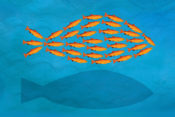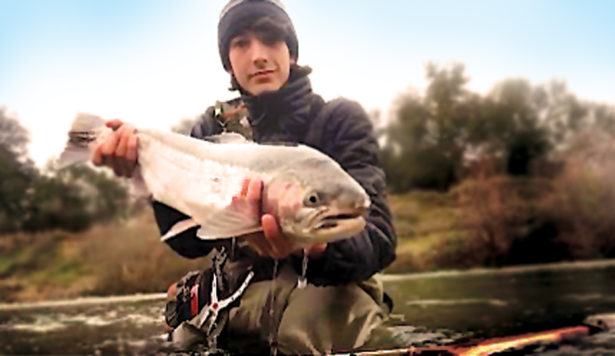Waldorf News
Teen Angler Advocates for Wild Fish and Mindful Fishing

By Kerin Gould
When Sam Christman, a high school student at Sacramento Waldorf School, saw the trailer for the documentary “Artifishal”, it really hit home.
The film documents threats facing our waters and wild fish, so the avid catch-and-release fisherman excitedly showed it to a friend, but his friend didn’t understand why it mattered. Sam realized that he had to bring this video to Sacramento. He coordinated the event with his favorite teachers, Dr. Gruhn and Mr. Pugh, reached out to local businesses for support and raffle prizes, and set up a screening in the auditorium of his school, which not-so-coincidentally borders the American River.
One of the themes of the film is man’s attempts to improve fish populations by controlling the wild, rather than working with nature. But that isn’t Sam’s approach to fishing. He recalls that as a child in Strawberry, “I had one of those little toy plastic fishing rods…and (I’d) just sit by this little stream and dip it in the water and pretend I was fishing. It wasn’t about me catching anything. It was about being there, hearing the water and the wind in the trees. It wasn’t man vs wild. It was always man with wild.”

Sam would love to see dams removed and hatcheries and fish farms shut down, but he points out, as the documentary does, that even wild fish raised in captivity are genetically weakened, which will affect generations of fish to come. Sam says that the folks who came up with hatcheries were basically agriculture people focused on increased yields in a process akin to feedlot cows or factory-farmed chickens. The fish “are just supposed to sit there and eat from a bowl,” he says. He worries that future salmon will just be sitting around in lakes or the ocean and not spawning.
“This whole eco-system, we’ve messed with it, and not too many people realize that…They think we’re not messing with the fish as long as we do it our way and do a hatchery that will keep the fish [population] going so we can catch them…We have to realize it’s not about us having fish. It’s about us living along side of them.”
What can his generation do to make a change? “We’ve just got to keep fighting… There is that little bit of gene left in the wild salmon. There’s still that urge to go upstream.”
Sam has worked with Trout Unlimited to clean up the creek just behind his school to allow Steelhead to come upstream to spawn. Since then he’s seen wild steelhead and salmon in the creek, as many as he has seen in his whole lifetime. Still, he says he has only caught a few wild fish in the last few years, and he notes that keeping the wild ones is prohibited. “I like that rule.”
Sam guides other anglers to fishing locations on the American river, and tries to teach them about the fish, for instance telling them to avoid catching fish when they are spawning, though some people will try to take advantage of the fish’s weakness, hooking fish in the back. “They don’t understand that when they are eating that fish, they are eating thousands of fish.”
Sam feels strongly that we need to educate and show people the vast numbers of fish that are dying, in order to get people to help the fish. He encourages people to buy conscientiously. “Watch out where your fish are coming from.” Sam encourages other young people to work with their schools to educate more people, and he is hoping to organize additional events where he can show this documentary around our region in the near future. Keep and eye out for Sam as wild-fish advocate and educator.
From valcomnews.com
 Great books for Waldorf Teachers & Families
Great books for Waldorf Teachers & Families Train to Teach in Seattle
Train to Teach in Seattle Caring for All Stages of Life
Caring for All Stages of Life Flexible preparation for your new grade
Flexible preparation for your new grade The Journey is Everything
The Journey is Everything Waldorf Training in Australia
Waldorf Training in Australia Space speaks. Its language is movement.
Space speaks. Its language is movement. Grade-specific web courses for teachers
Grade-specific web courses for teachers Grade Level Training in Southern California
Grade Level Training in Southern California Quality Education in the Heartland
Quality Education in the Heartland Bringing Love to Learning for a Lifetime
Bringing Love to Learning for a Lifetime Preparing Teachers for 2024-25 Grades 1-8
Preparing Teachers for 2024-25 Grades 1-8 ~ Ensoul Your World With Color ~
~ Ensoul Your World With Color ~ Association for a Healing Education
Association for a Healing Education Bay Area Teacher Training
Bay Area Teacher Training Everything a Teacher Needs
Everything a Teacher Needs Waldorf-inspired Homeschool Curriculum
Waldorf-inspired Homeschool Curriculum Middle School Science With Roberto Trostli
Middle School Science With Roberto Trostli Training in Traumatology & Artistic Therapies
Training in Traumatology & Artistic Therapies Roadmap to Literacy Books & Courses
Roadmap to Literacy Books & Courses Jamie York Books, Resources, Workshops
Jamie York Books, Resources, Workshops Full-Time Teacher Education
Full-Time Teacher Education Summer Programs - Culminating Class Trips
Summer Programs - Culminating Class Trips Waldorf Stories for Everyone
Waldorf Stories for Everyone Immersive Academics and Arts
Immersive Academics and Arts Transforming Voices Worldwide
Transforming Voices Worldwide RSS Feeds
RSS Feeds